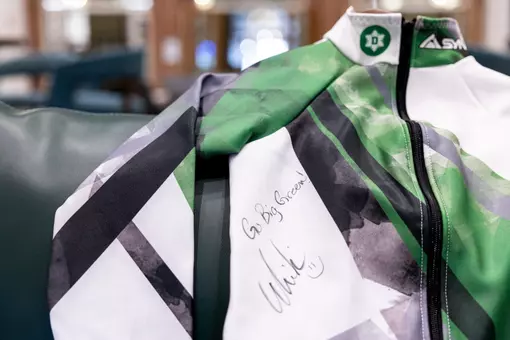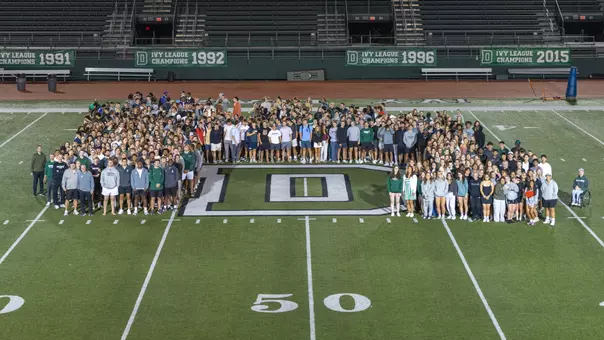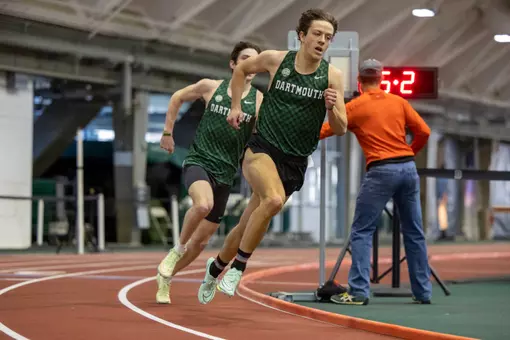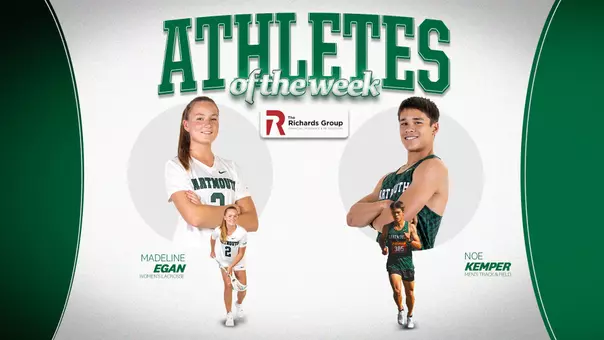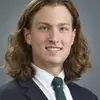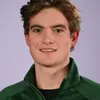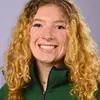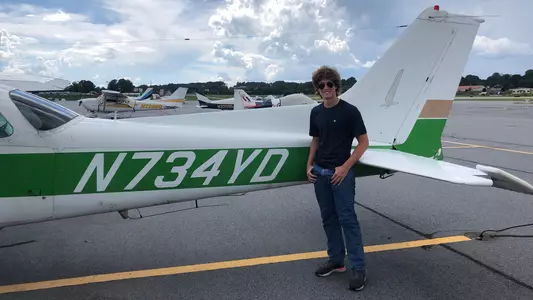
Davis Golick is always ready to hop in a plane and take flight.
In the Pilot’s Seat: Dartmouth Athletes Take to the Skies
1/18/2023 2:00:00 PM | Football, Skiing, Athletics
Davis Golick, Oliver Morgan and Garvee Tobin are all licensed pilots
I don't think I can be alone when I say that I see the world differently from a plane. I marvel at the world below. The lights. The tiny cars. The wide expanse of undeveloped, open spaces. Staring out the window, I have whole hours of reflection while watching the clouds go by.
Now imagine being the one flying the plane.
For Davis Golick '25 (football), Garvee Tobin '24 (Nordic skiing) and Oliver Morgan '25 (alpine skiing), a lofty dream for many became reality through a lot of hard work. Forty hours of hard work, to be exact, though all three agreed that it took longer.
"The minimum requirement for logged student pilot time before you are eligible to get a full license is 40 hours," Morgan said, "but normally, it takes much more than that. You need a certain amount of time maneuvering in specific scenarios, such as night, cross country, and solo flight, so in the end, people normally have over 60 hours of total time before taking their test."
Tobin started the process when she was 14, but infrequent flights over the winters and a break for a concussion meant she got her license at 17. Golick mentioned that it took him longer because of football, a full course load and then COVID. "I made a big push to finish in the summer of 2021 before I came up to Dartmouth and finished about a week and a half before pre-season camp started."
After getting their licenses, the training didn't stop there. Tobin said that it was hard to remember all of the rules and regulations, and Golick said that there were a lot of checklists and procedures involved that need to be memorized. "I have a decent memory, but it can be difficult to multitask in the airplane and remember every step of a given checklist."
How did getting their pilot's license first become a goal? For Morgan, one flight with a family member was all it took. "When I was around 10 or 12, my uncle took me up in his small plane on a flight around Lake Tahoe. From then on, I always saw getting my license as a long-term goal. I think what hooked me was wanting to understand the systems of airplanes."
Flying has been a way of Tobin's life for as long as she can remember. "There is a very established culture around flying small planes (seating from two to eight people) in Alaska, my home state," she said. "Because so much of our state is inaccessible by car, having a small plane that can land on any beach, tundra or glacier truly opens up the state. Being around planes my whole life, I think I always wanted to learn how to fly. And then, my stepdad bought me flight lessons for my 14th birthday, and the rest is history."
Golick remembers taking a commercial flight as a child and, though the destination doesn't stand out all these years later, the excitement still does. "What I remember most distinctly was looking out the window on take-off and seeing how small everything below was. Being as young as I was, that was definitely a mind-blowing experience."
How do flying a plane and training as an athlete compare? You may not see the connection, but you also may not be looking closely enough. "It has helped me know how to stay calm and focused," Morgan said. "With the number of variables that you have to stay on top of, it can be easy to become overwhelmed and panic. I remember expecting to be a nervous wreck before my first solo flight, but being able to lock in and trust all of my training allowed me to do what I had practiced so many times before. In ski racing, I used to always feel under-prepared for runs. After leaving the start gate, there is really no other option than doing the best you can with the training you have done and trusting that what you have practiced will help. My first solo was a very similar feeling where all I could do was stick to what I knew and trust my ability to perform."
Golick also noted that his sport has taught him how to maintain focus for longer periods of time while in the cockpit. "Blocking out distractions is a huge part of football and having to do the same thing in the air has definitely aided my development."
Tobin said that it wasn't a one-way transaction. "I do think my training as an athlete helped me with flying in regard to being diligent and dedicated to learning how to be the best pilot I can be. But, on the flip side, I think being a pilot especially helped my skiing. So many things can and do go wrong when you fly planes: things break, you run into bad weather, you can even get lost. You realize that there are so many things outside of your control that you can only focus on what is in your control. So much of skiing comes down to luck (wax, snow conditions, gear breaking), so all you can really control is yourself and how you handle yourself. In a ski race, when something goes very wrong, it's not life or death, but keeping a level head can make a world of difference."
The feelings a lot of us get in the air aren't foreign to the person controlling it and all three student-athletes used the word 'freeing' to describe the experience. Having grown up in Hanover, Morgan mentioned that driving around here takes longer than necessary, so "having new places within reach is very nice. The freedom to go pretty much anywhere is one of my favorite parts of being in control of a plane."
Golick said much the same, stating, "I can go anywhere, do anything, start and stop whenever I want. The best way to describe it is the difference between riding a bus and driving a car yourself. Both get you from A to B, but one is clearly better." Tobin said that flying a plane is a really empowering experience. "You have full agency to go practically anywhere when you're in the air. It's hard to describe in words the sense of freedom you get when you take off in a plane under your control."
Tobin and Golick said that becoming a pilot has changed their experience as passengers. Tobin enjoys being in small places and seeing the controls because "it's fun to know exactly what's going on and knowing why the pilot is doing what he's doing. And turbulence doesn't scare me anymore as it did as a kid." Golick said he has more respect for the pilots and crew of airlines and all the hard work they do. "In the past year, I've been on a few commercial flights that have been delayed due to maintenance issues. Even though I was frustrated, I have more respect for all the elements that factor into the go/no go decision, especially with passengers on board."
Although Morgan said his perspective hasn't really changed, he did say that he is more relaxed on flights than he was before. "I really enjoy looking out the window, and not being the one in charge of the flight itself can allow me to do more of that."
And how does Dartmouth look from above? Beautiful, as you can imagine. "Last fall," Tobin said, "I rented a plane from West Lebanon and flew around the Upper Valley during peak foliage. Campus looked so stunning, and it was definitely the best way to leaf peep."
Now imagine being the one flying the plane.
For Davis Golick '25 (football), Garvee Tobin '24 (Nordic skiing) and Oliver Morgan '25 (alpine skiing), a lofty dream for many became reality through a lot of hard work. Forty hours of hard work, to be exact, though all three agreed that it took longer.
"The minimum requirement for logged student pilot time before you are eligible to get a full license is 40 hours," Morgan said, "but normally, it takes much more than that. You need a certain amount of time maneuvering in specific scenarios, such as night, cross country, and solo flight, so in the end, people normally have over 60 hours of total time before taking their test."
Tobin started the process when she was 14, but infrequent flights over the winters and a break for a concussion meant she got her license at 17. Golick mentioned that it took him longer because of football, a full course load and then COVID. "I made a big push to finish in the summer of 2021 before I came up to Dartmouth and finished about a week and a half before pre-season camp started."
After getting their licenses, the training didn't stop there. Tobin said that it was hard to remember all of the rules and regulations, and Golick said that there were a lot of checklists and procedures involved that need to be memorized. "I have a decent memory, but it can be difficult to multitask in the airplane and remember every step of a given checklist."
How did getting their pilot's license first become a goal? For Morgan, one flight with a family member was all it took. "When I was around 10 or 12, my uncle took me up in his small plane on a flight around Lake Tahoe. From then on, I always saw getting my license as a long-term goal. I think what hooked me was wanting to understand the systems of airplanes."
 |
| Growing up in Alaska, flying planes are simply a way of life for Garvee Tobin. |
Golick remembers taking a commercial flight as a child and, though the destination doesn't stand out all these years later, the excitement still does. "What I remember most distinctly was looking out the window on take-off and seeing how small everything below was. Being as young as I was, that was definitely a mind-blowing experience."
How do flying a plane and training as an athlete compare? You may not see the connection, but you also may not be looking closely enough. "It has helped me know how to stay calm and focused," Morgan said. "With the number of variables that you have to stay on top of, it can be easy to become overwhelmed and panic. I remember expecting to be a nervous wreck before my first solo flight, but being able to lock in and trust all of my training allowed me to do what I had practiced so many times before. In ski racing, I used to always feel under-prepared for runs. After leaving the start gate, there is really no other option than doing the best you can with the training you have done and trusting that what you have practiced will help. My first solo was a very similar feeling where all I could do was stick to what I knew and trust my ability to perform."
Golick also noted that his sport has taught him how to maintain focus for longer periods of time while in the cockpit. "Blocking out distractions is a huge part of football and having to do the same thing in the air has definitely aided my development."
Tobin said that it wasn't a one-way transaction. "I do think my training as an athlete helped me with flying in regard to being diligent and dedicated to learning how to be the best pilot I can be. But, on the flip side, I think being a pilot especially helped my skiing. So many things can and do go wrong when you fly planes: things break, you run into bad weather, you can even get lost. You realize that there are so many things outside of your control that you can only focus on what is in your control. So much of skiing comes down to luck (wax, snow conditions, gear breaking), so all you can really control is yourself and how you handle yourself. In a ski race, when something goes very wrong, it's not life or death, but keeping a level head can make a world of difference."
The feelings a lot of us get in the air aren't foreign to the person controlling it and all three student-athletes used the word 'freeing' to describe the experience. Having grown up in Hanover, Morgan mentioned that driving around here takes longer than necessary, so "having new places within reach is very nice. The freedom to go pretty much anywhere is one of my favorite parts of being in control of a plane."
Golick said much the same, stating, "I can go anywhere, do anything, start and stop whenever I want. The best way to describe it is the difference between riding a bus and driving a car yourself. Both get you from A to B, but one is clearly better." Tobin said that flying a plane is a really empowering experience. "You have full agency to go practically anywhere when you're in the air. It's hard to describe in words the sense of freedom you get when you take off in a plane under your control."
Tobin and Golick said that becoming a pilot has changed their experience as passengers. Tobin enjoys being in small places and seeing the controls because "it's fun to know exactly what's going on and knowing why the pilot is doing what he's doing. And turbulence doesn't scare me anymore as it did as a kid." Golick said he has more respect for the pilots and crew of airlines and all the hard work they do. "In the past year, I've been on a few commercial flights that have been delayed due to maintenance issues. Even though I was frustrated, I have more respect for all the elements that factor into the go/no go decision, especially with passengers on board."
Although Morgan said his perspective hasn't really changed, he did say that he is more relaxed on flights than he was before. "I really enjoy looking out the window, and not being the one in charge of the flight itself can allow me to do more of that."
And how does Dartmouth look from above? Beautiful, as you can imagine. "Last fall," Tobin said, "I rented a plane from West Lebanon and flew around the Upper Valley during peak foliage. Campus looked so stunning, and it was definitely the best way to leaf peep."
Players Mentioned
Men's Lacrosse at Boston University Postgame 2.15.26
Sunday, February 15
Men's Basketball vs. Brown Postgame Press Conference 2.14.26
Sunday, February 15
Men's Hockey Postgame at Brown - 2.14.26
Sunday, February 15
Women's Hockey Postgame - Cally Dixon and Ella Inglis - 2.14.26
Saturday, February 14

